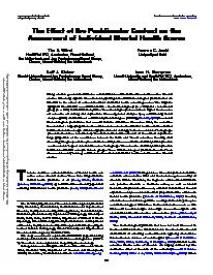The Effect of the Postdisaster Context on the Assessment of Individual Mental Health Scores
Many scholars question the immense variation in rates of mental health outcomes across disaster studies. This study explains this variation by putting forward 2 methodological problems that are inherent to the effect of a disaster context on mental health screening scores. The Hopkins Symptom Checklist-25 was administered in a flood-affected group (n = 318) and a nonaffected group (n = 304) in Uttar Pradesh, India. The affected group showed much higher mean scores on subscales of anxiety and depression. However, factor analyses (i.e., confirmatory factor analyses [CFA] and multilevel confirmatory factor analyses [MCFA]; Muthén, 1994) revealed 2 methodological phenomena that account for the differences in scores. First, the outcomes revealed that a large proportion of covariance between observed mental health variables did not refer to the latent concepts of interest (depression and anxiety), but to the context of both groups (disaster affected vs. nonaffected). The shared effect of the disaster on the context explained a large proportion of the covariances between the items and biased outcomes. Second, after dissecting this group variance, the construct validity of the assessments of anxiety and depression was revealed to be poor and unstable across both groups. The subscales of anxiety and depression referred to different concepts in both groups. These 2 methodological problems have not been discussed thus far, but they contribute to the variation in mental health outcomes across disaster studies.
Geachte bezoeker,
De informatie die u nu opvraagt, kan door psychotraumanet niet aan u worden getoond. Dit kan verschillende redenen hebben,
waarvan (bescherming van het) auteursrecht de meeste voorkomende is. Wanneer het mogelijk is om u door te verwijzen naar de bron
van deze informatie, dan ziet u hier onder een link naar die plek.
Als er geen link staat, kunt u contact opnemen met de bibliotheek,
die u verder op weg kan helpen.
Met vriendelijke groet,
Het psychotraumanet-team.
Referentie:
Tim R. Wind, Pooran C. Joshi, Rolf J. Kleber, & Ivan H. Komproe | 2014
In: American Journal of Orthopsychiatry, ISSN 0002-9432 | 84 | 2 | maart | 134-141
http://psycnet.apa.org/journals/ort/84/2/134/
In: American Journal of Orthopsychiatry, ISSN 0002-9432 | 84 | 2 | maart | 134-141
http://psycnet.apa.org/journals/ort/84/2/134/
Affiliatie auteur(s):


